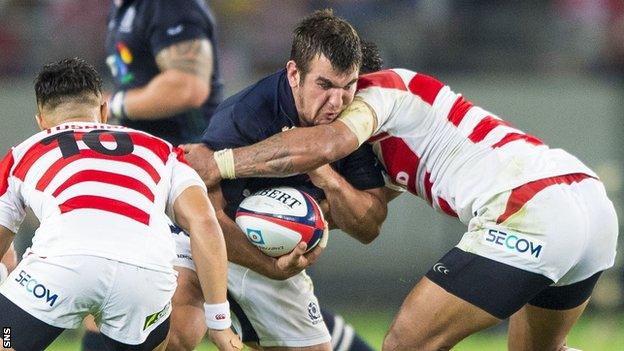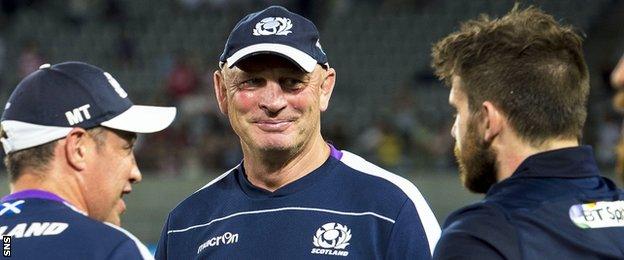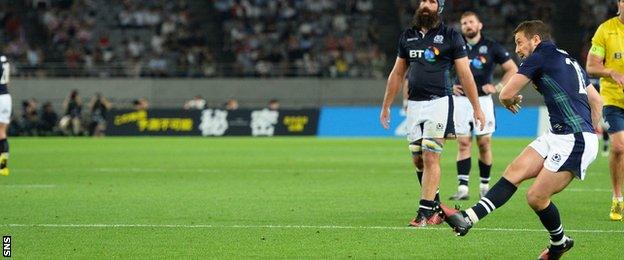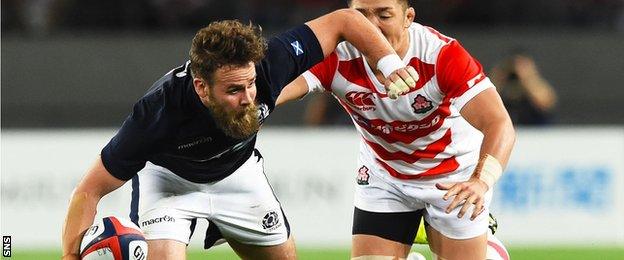Vern Cotter's Scotland go backwards in victory over Japan
- Published

Scotland recorded two wins over Japan
When Mark Hammett, the interim Japan coach, named his 33-man training squad for the two-Test series with Scotland, the focus wasn't so much on the players that were there but those who were not.
Where were all the heroes of Brighton in the autumn, the immortals who beat South Africa in the World Cup? Five of that starting line-up had gone missing for reasons of injury, retirement and Olympics Sevens commitments, including Ayumu Goromaru, the darling of Japanese rugby, Michael Leitch, the team's most influential player, and Akihito Yamada, their most dangerous wing.
Then Fumiaki Tanaka, the excellent scrum-half, was invalided out of the series. When Japan played the Scots in that opening Test in Toyota City, they were shorn of seven of the players who started against the Springboks and another two who played off the bench.
Hammett had to dig deep into his 33-man squad - 17 of whom had fewer than 10 caps. Seven starters against Scotland in Toyota had seven caps or fewer.
For the second Test in Tokyo, that number fell by just one. They were still a team lacking Test match experience in pockets of the field.
Japan may have lost both matches, but they managed something that Scotland did not - they grew their pool of players. It is true that they came away from the series frustrated by their own ill-discipline and their inability to close a game out. They were angered by some refereeing calls that led to Hammett saying that his team had been "disrespected" over the two Tests. Yet they expanded their options in many positions.
Leaving the Ajinimoto Stadium on Saturday night, the feeling was that Japan are going to be in rude health once their go-to men reappear and their inexperienced players develop more street smarts in the heat of a Test. Hammett hands over the head coaching reins to Jamie Joseph, his fellow Kiwi, in the knowledge that some new players have staked a big claim.
Vern Cotter can have the satisfaction of two victories in difficult conditions at the end of a brutally long, 16-Test match season.
He spoke about his team's character in the wake of Saturday night. Even in recent times, Scotland have lost games they ought to have won - Australia at the World Cup, Italy in the Six Nations before that and a few others that left a bitter taste - so any change to that grim dynamic was to be welcomed.
Winning a game they deserved to lose - as was the case in Tokyo - was a welcome break from the norm. In the endgame, Scotland brought enough nerve and intelligence to get the job done, a turning point sparked by great leadership and deadly goal-kicking from Greig Laidlaw.
The overall performance - and the series in general - was a let-down, though. You hoped that Scotland wouldn't need to resort to the, admittedly understandable, explanations we heard after both Tests.

Scotland coach Vern Cotter (centre) has promised an "honest" review of their tour
Humidity and fatigue were mentioned on back-to-back Saturdays. The wish was that Scotland would turn up and play a clinical brand of rugby that took excuses out of the equation, but it didn't happen.
They scored two tries in 160 minutes of rugby - a penalty try and a two-yard blast from WP Nel - while Japan were down on numbers. Their opponents had 14 players on the field for the first try and 13 for the second. Scotland didn't score a try while their hosts had 15 on the park.
In Tokyo, they created nothing. They posed little or no attacking threat, and gained zero momentum because of their colossal error count.
Cotter sent up the distress signals at half-time, when he replaced his entire front row, then he did it again when taking off his captain, Henry Pyrgos, with half-an-hour to play. Laidlaw sorted it from there, but it was a scary night, a night that meant that the season finished on a flat and troubling note.
This is not being overly pessimistic; it is being exacting. It is being demanding of players whose standards should be a whole lot higher. If we go down the "win is a win" road it is a dangerous route, a place where only the bottom line matters.
There is more to it. There has to be if this Scotland team are going to fire a shot at competing for a Six Nations title any time soon.
Cotter promised "total honesty" in the review and it is impossible to doubt him for a second.

Greig Laidlaw's penalties secured Saturday's win over Japan
This was a great opportunity for some fringe players to lay down a significant claim for the first team, but none of them did. It was a series not against Australia, where England reigned, or South Africa, where Ireland won a battle but agonisingly failed to win the war, or New Zealand, where Wales were crushed.
It was a series against a side in transition, with a new coach and new players. A good side but not a super-power, a side that Scotland should have been able to put away impressively instead of stumbling against unconvincingly.
Damien Hoyland had his first start in Toyota, but things did not happen for him because everything was so stop-start. Ruaridh Jackson didn't advance his cause, neither did Stuart McInally,
Cotter picked the Rory Sutherland-McInally-Moray Low unit in the hope that they would mark themselves out as the next wave behind the Alasdair Dickinson-Ross Ford-Nel front row. Japan found new options over the course of the series. Scotland did not.
All of these guys might well kick on. It is not as if their chances have been and gone, far from it. But it would have been good to have a Eureka moment, the emergence of a player, or a unit, to give food for thought before the autumn Tests.
England are adding new players to their mix and, in defeat, Ireland and Wales found out things about themselves. Ireland, in particular, blooded new guys who stood up well under the pressure.

Ruaridh Jackson (left) did not advance his cause in Japan
It's hard to know what Cotter learned. Yes, he saw his team show guts and calmness in the dicey endgame in Tokyo, but that wouldn't have surprised him. He's seen a bit of that already against Samoa and France.
It's been mentioned that Scotland might have lost that Tokyo match a few years ago. And it is probably true.
It has also been said that if you can dig out a win even when playing poorly then that says something for a team - and it does. There needs to be progression, though. There need to be signs that Scotland could be a force in the Six Nations. We didn't see them in Japan.
A big sign of a team's standing is the depth of their squad. On this evidence, Scotland's is no deeper.
It is true that Scotland might have loudly acclaimed this winning series a few years ago, but things have moved on. Their expectations are higher now.
There were two wins, sure, but soft-soaping is self-defeating. This was a step back.
- Published26 June 2016

- Published25 June 2016

- Published25 June 2016

- Published14 September 2016
